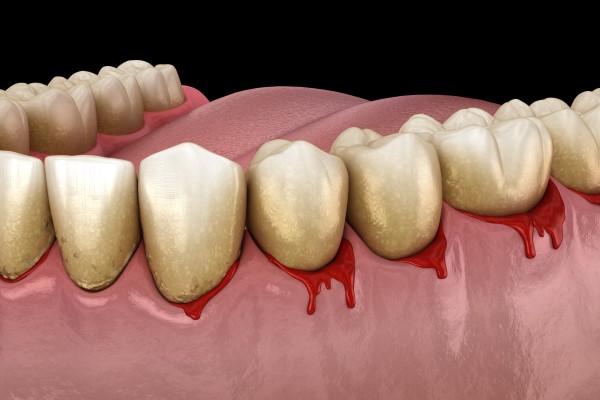The Most Common Types of Gum Disease

If you notice that your gums are bright red, swollen-looking, or bleed when you brush or floss, then you may have gum disease. This disease, also known as periodontal disease, is unfortunately quite common though, so you are not alone. It happens most often due to a build-up of bacteria on and around teeth thanks to improper brushing and flossing habits, so proper mouth cleaning techniques and routine trips to your dentist are a must.
The stages of periodontal disease
There are two major stages of gum disease. The early stage is called gingivitis, and the more advanced stage is known as periodontitis.
Gingivitis
This stage appears just after the initial bacterial infection occurs. Many people do not recognize right away that they have gingivitis. Often the process is too gradual at first and tough to notice as it generally does not cause any pain until later stages. Common indicators of gingivitis include:
- Halitosis or bad breath
- Gums that bleed more easily when brushed or flossed
- Red or purple colored gums
- Swollen or irritated gums
- Gums that are tender to the touch
Fortunately, gingivitis is usually reversible so if you think you have it, immediately begin a proper teeth cleansing regimen including an appropriate antibacterial mouthwash and swiftly schedule a visit to your dentist.
Periodontitis
If you do not catch that you have gingivitis, then it may advance and become periodontitis. Periodontitis causes more severe issues than gingivitis and normally requires a dentist to intervene. During this stage, the gums may begin to recede and pull away from the teeth, leaving open pockets for bacteria to gather and leading to further infection. Often, this further infection destroys the surrounding tissue and causes teeth to become loose. Sometimes this causes pain and even makes eating difficult because it becomes hard to chew correctly.
Fully advanced periodontitis may even eat away at the jaw bone and destroy so much of the bone and tissue holding your teeth in place that they fall out entirely. The good news is that most cases are still treatable. At its most severe stages, periodontitis requires antibiotic medication as well as extensive cleaning and repair work by your dentist. This work may include scaling and root planing, procedures through which dentists scrape your teeth and smooth the root surfaces to remove the plaque on, around, and under your teeth. Your dentist may also use implants to replace any teeth you lost, but only once your gums are healthy again. In a few extreme cases, surgical procedures including gum and bone grafts, pocket reduction surgery, and tissue regeneration may be necessary.
Conclusion
Gum disease is not something to mess around with. It not only harms your mouth, but it can expand to other parts of the body too, such as the heart, lungs, and brain. Periodontal disease may be linked to other health conditions like diabetes, heart disease, and stroke. Stay ahead of the spread by adequately brushing, flossing, and rinsing at least twice a day and seeing your dentist for regular check-ups and cleanings.
Request an appointment here: https://woodlandparkdental.com or call Woodland Park Dental at (801) 416-1603 for an appointment in our Layton office.
Check out what others are saying about our dental services on Yelp: Gum Disease in Layton, UT.
Related Posts
Gum disease is a common yet serious oral health issue that can cause discomfort, damage, and even tooth loss if left untreated. With the right gum disease treatment, patients can not only stop the infection in its tracks but also restore the patient's overall oral health. Knowing the true impact of gum disease and how…
Gum disease or periodontitis begins when there is plaque accumulation on your teeth. Your oral health will start to deteriorate at the onset of periodontitis. This will affect your smile in a negative way. If you want to know how treating your gum disease can help improve your smile, here are the facts.Battling gum disease…
Gum recession is a type of dental issue that can happen to anyone for several reasons. The problem arises when the gum tissue along the gum line starts receding. This can cause your smile not to appear as healthy as it once was. For some people, this can be an uncomfortable condition and may even…
Fluoride is an all-around defense for your teeth, gums, and whole mouth. This is why many towns add the mineral to drinking water as a matter of public health. Dentists also use fluoride treatments to protect their patients’ teeth from tooth decay.Read on for a brief walkthrough of how fluoride protects the teeth at a…

